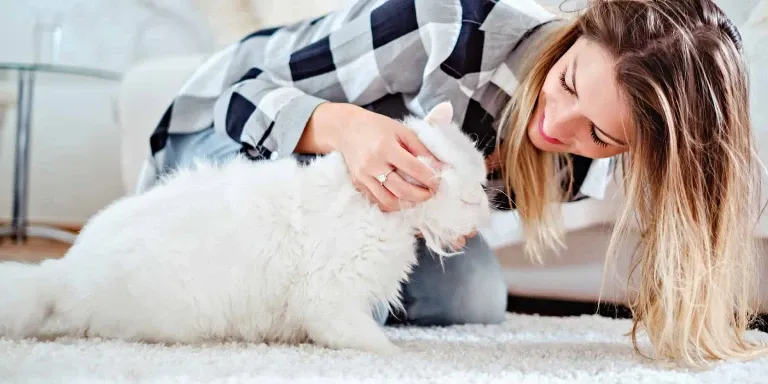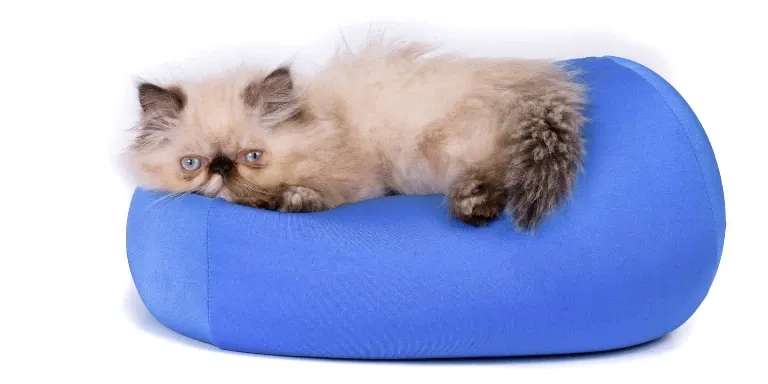The Best Fluffy Pancakes recipe you will fall in love with. Full of tips and tricks to help you make the best pancakes.

Are Persian cats really as unfriendly as some people say? You may have heard rumors about these regal and elegant felines being aloof and unsociable, but is there any truth to these claims?
Persian cats are not necessarily unfriendly. While they may have a reputation for being aloof or reserved, it ultimately depends on the individual cat’s personality and how they are raised and socialized. Just like any other breed, Persian cats can be loving, affectionate, and friendly towards their owners and other people.
As a lover of cats, you want to know the real story behind these rumors. After all, you want a pet that will be a loyal and loving companion, not one that will ignore you or lash out at you for no reason.
Well, the good news is that Persian cats are not inherently unfriendly or aggressive. In fact, they can be some of the sweetest and most affectionate cats around, with a reputation for being great lap cats and snuggle buddies.
But like any other breed of cat, Persians have their own unique personalities and quirks, and they may not be the right fit for everyone. In this article, we’ll take a closer look at the Persian cat breed, their behavior towards people and other pets, and the reasons behind the misconceptions about their friendliness.
By the end, you’ll have a better understanding of whether a Persian cat is the right pet for you.
Overview of Persian Cat Breed
So, if you’re curious about Persian cats, you’ll be happy to know that they’re a gentle and affectionate breed. Despite their reputation for being aloof or unfriendly, Persians are actually quite loving and crave human attention.
They are known for their calm and docile personality, making them ideal pets for families and apartment living. One important aspect to consider when owning a Persian cat is their grooming needs. Their long, luxurious coats require daily brushing to prevent matting and tangling.
Neglecting their grooming needs can lead to skin irritations and health issues. Additionally, their flat faces can cause respiratory problems and eye infections, so it’s important to regularly clean their eyes and keep their environment clean.
While Persians are generally healthy cats, they are prone to certain health concerns such as kidney disease and polycystic kidney disease. It’s important to have regular check-ups with a veterinarian to catch any potential health issues early on.
By providing proper care and attention, Persians can live long and happy lives as loving companions.
Personality Traits
Personality traits can vary greatly among different types of animals, and it’s worth exploring whether certain common beliefs about these traits are actually true.
Persian cats are often thought of as being aloof and unfriendly, but this is not always the case. In fact, Persian cats can be quite affectionate and playful, but it depends on how they are raised and trained.
Training techniques play a crucial role in shaping a Persian cat’s personality. If a Persian cat is raised with positive reinforcement techniques and given plenty of socialization, they can be very friendly and outgoing. However, if a Persian cat is raised with punishment-based techniques, they may become fearful and aggressive. It’s important to use training techniques that promote positive interactions and build trust between you and your cat.
Handling aggression can also be a challenge with Persian cats. If you notice your cat becoming aggressive, it’s important to address the issue immediately. Punishment-based techniques will only make the problem worse, so it’s important to use positive reinforcement to encourage good behavior.
Additionally, providing plenty of toys and playtime can help reduce aggression by giving your cat an outlet for their energy. With patience and consistency, even the most aggressive Persian cat can learn to be friendly and loving.
Behavior towards People
It’s important to understand how animals behave towards people in order to create a positive and safe environment for both the animal and the human.
Persian cats, like any other feline, have their own unique way of communicating with humans. Understanding feline body language is crucial in creating a bond with your Persian cat and making sure that they feel comfortable and safe around you.
When it comes to behavior towards people, Persian cats can be quite affectionate and friendly. They enjoy being around their owners and often seek out attention and affection. However, it’s important to remember that each cat has their own personality and individual preferences.
Some Persian cats may be more reserved or independent than others, but with patience and socialization techniques, they can still develop a strong bond with their owners.
Socialization techniques for cats can help them become more comfortable around people and other animals. This involves gradually introducing them to different environments, people, and animals in a positive and controlled manner.
It’s important to start socializing your Persian cat at a young age, but older cats can also benefit from these techniques. By providing a safe and positive environment for your Persian cat, you can help them feel more comfortable and friendly towards people.
Behavior towards Other Pets
If you have another pet at home, you’ll be happy to know that Persian cats can get along well with other animals. They’re not naturally aggressive towards other pets and are even known to be friendly towards dogs. However, like any other cat breed, Persian cats need proper training and socialization to learn how to coexist with other animals.
Introducing pets to each other can be a tricky process, but with patience and the right training techniques, it can be successful. It’s important to introduce the pets gradually and in a controlled environment. Keep them separated at first and allow them to sniff each other through a closed door.
Gradually increase their interaction time and always supervise their interactions. Training techniques like positive reinforcement can also help create a peaceful environment for your pets. Reward your pets with treats and praise whenever they exhibit good behavior towards each other. Punishing them for bad behavior can only worsen the situation.
With proper training and patience, Persian cats can be great companions for other pets in the household.
Reasons for Misconception
You may have heard that Persian cats are unfriendly towards other pets, but this is actually a common misconception.
One reason for this misunderstanding is a lack of socialization during the kitten’s early developmental stages.
Additionally, Persian cats are often perceived as having an independent nature, which can lead to the assumption that they prefer to be alone.
However, with proper socialization and care, Persian cats can be friendly and get along well with other pets.
Lack of Socialization
Don’t assume that Persian cats are unfriendly just because they haven’t been properly socialized. Socialization is crucial for all cats, including Persians, to learn how to interact with humans and other animals. Unfortunately, many cat owners fail to provide their pets with the proper socialization techniques, leading to a lack of trust and comfort around people.
Common mistakes include not exposing kittens to new experiences, not handling them enough, and not introducing them to other pets. Without socialization, Persian cats may become shy, fearful, or aggressive towards humans and other animals. However, with proper socialization, Persians can be just as loving and friendly as any other breed of cat.
The key is to start early, provide plenty of positive experiences, and gradually expose them to new people and situations. So, don’t jump to conclusions about Persian cats being unfriendly until you’ve given them a chance to be properly socialized.
Persian cats are not naturally unfriendly, but can become so if they haven’t been socialized properly. As a potential pet owner, it’s essential to understand the importance of socialization and to commit to providing your Persian with the necessary experiences to become a happy, well-adjusted pet. With patience, consistency, and positive reinforcement, your Persian can become a loving and loyal companion for years to come.
Misconception of Independent Nature
Hey there, did you know that it’s a common misconception that all cats, including Persians, are naturally independent and aloof?
In fact, while Persians may appear to be distant and uninterested, they’re actually quite affectionate and enjoy spending time with their human companions. This stereotype has likely arisen due to the Persian cat’s regal and elegant appearance, which is often associated with a sense of superiority and detachment.
Exploring stereotypes is important when it comes to understanding the true nature of any animal, especially when it comes to pets. While it’s true that Persian cats may not be as outgoing as some breeds, they still require socialization and interaction with their owners in order to thrive.
Without proper socialization, Persians can become anxious, depressed, and even aggressive. So, if you’re considering bringing a Persian cat into your home, be sure to give them plenty of love and attention, and don’t let stereotypes dictate your expectations of their behavior.
Tips for Ensuring a Happy and Friendly Persian Cat
If you want your Persian cat to be happy and friendly, make sure to provide plenty of toys and playtime. Persian cats are known for being playful and curious creatures, so it’s important to engage them in activities that challenge their minds and bodies. You can provide them with a variety of toys, such as catnip toys, balls, and scratching posts, to keep them entertained.
Additionally, playing with your Persian cat on a regular basis will help build a bond between you and your pet. Another important factor in ensuring a happy and friendly Persian cat is to stay on top of their grooming needs. Persian cats have long, luxurious coats that require regular brushing and grooming to prevent matting and tangles.
Not only does regular grooming keep your cat looking and feeling good, but it also helps to prevent health issues such as hairballs and skin irritations. By providing your Persian cat with the proper grooming care, you’re helping to keep them healthy and happy. Lastly, it’s important to provide your Persian cat with a safe and comfortable environment to live in.
This includes providing them with a cozy bed, plenty of fresh water, and a clean litter box. Additionally, make sure to keep your home free from hazards such as toxic plants and small objects that your cat could accidentally ingest. By creating a comfortable and safe environment for your Persian cat, you’re helping to ensure their happiness and well-being.
Myth-busting Unfriendly Persian Cats
You may have heard that Persian cats are unfriendly, but let’s bust that myth and learn some facts about these amazing felines. Understanding feline behavior is crucial in debunking cat-related myths.
Persian cats, like any other breed, have distinct personalities and moods that can affect their behavior towards humans.
- Persian cats are known for their calm and laid-back demeanor. They’re not as active as other breeds and prefer to lounge around and be pampered. This trait makes them great lap cats and perfect for those who want a relaxed and affectionate companion.
- Persians are highly intelligent, which means they require mental stimulation to avoid boredom. Lack of stimulation can lead to destructive behavior, such as scratching furniture or chewing on household items. Therefore, it’s essential to provide them with interactive toys and games to keep them entertained and engaged.
- Persian cats are not naturally aggressive or unfriendly. They can be shy and reserved around strangers, but with proper socialization and training, they can become friendly and welcoming to everyone. As with any pet, it’s crucial to establish a bond with your Persian cat by spending quality time with them and showing them affection.
Persian cats are not unfriendly, but they have unique personalities that require proper understanding and care.
By providing them with mental stimulation, socialization, and love, you can help them become the friendly and affectionate companions they’re known to be.
So, don’t let the myth of unfriendly Persian cats deter you from adopting one; instead, embrace the opportunity to share your life with a loving and loyal feline friend.
Are Persian Cats Unfriendly or Do They Enjoy Cuddling?
Persian cats are known for their cuddle preference. While some may appear aloof, many Persian cats enjoy affection and closeness. Their friendly nature often shines through when they feel comfortable and safe, making them great companions for those who enjoy cuddling with their feline friends.
Final Thoughts
In conclusion, Persian cats aren’t inherently unfriendly. They may have a reputation for being aloof or standoffish, but this isn’t always the case.
With proper socialization and care, Persian cats can be just as affectionate and loving as any other breed. For example, take the case of a Persian cat named Luna. Luna was initially shy and reserved, but with patience and consistent socialization, she became a friendly and outgoing cat who loves nothing more than snuggles and playtime with her owners.
This demonstrates that with the right approach, even a cat with a reputation for being unfriendly can become a loving and cherished member of the family. Remember, every cat is an individual and may have their own unique personality and preferences.
By providing proper care, attention, and socialization, you can help your Persian cat become a happy and friendly companion for years to come.








